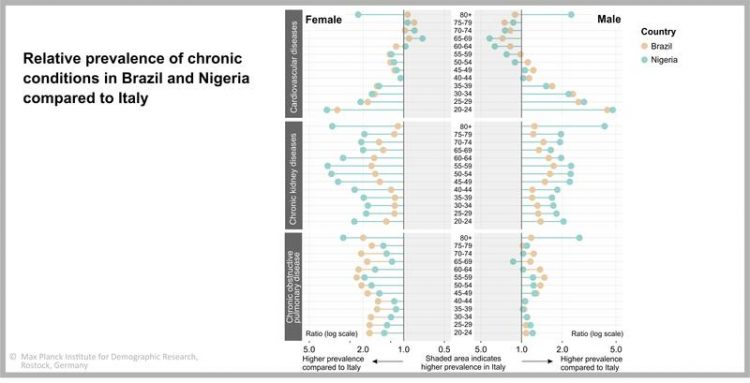Young, but chronically diseased: One reason why the COVID-19 Pandemic looks different in the Global South

Chronic diseases are more common at working-age in the Global South. The proportion of people with cardiovascular diseases in their early 20s is for example more than two times higher in Brazil and Nigeria compared to Italy. Max Planck Institute for Demographic Research (MPIDR)
At almost every age within this population group, more people in Brazil and Nigeria suffer from pre-existing chronic conditions than in European countries, such as Italy. This increases their risk of a severe case of COVID-19.
“We have been able to show that the prevalence of cardiovascular diseases, chronic obstructive pulmonary disease, and chronic kidney disease in Brazil and Nigeria is considerably higher relative to Italy,” said Marília Nepomuceno.
The researcher at the Max Planck Institute for Demographic Research (MPIDR) in Rostock, Germany, used data from the Global Burden of Disease Database for her analysis.
The results show that the proportion of people with cardiovascular diseases in their early 20s is more than two times higher in Brazil and Nigeria compared to Italy. For chronic kidney disease and chronic obstructive pulmonary disease, the prevalence in Brazil and Nigeria is also considerably greater relative to Italy.
It is particularly higher for people over the age of 40. Among women, for instance, differences in prevalence can be up to four times higher in Nigeria than in Italy. These health disadvantages, which are common in the Global South, suggest that their working-age populations are far more vulnerable to severe forms of COVID-19 disease than that of Europe.
Together with her MPIDR colleagues Enrique Acosta and Diego Alburez-Gutierrez and an international team of researchers, Marília Nepomuceno published her study in the Proceedings of the National Academy of Sciences (PNAS).
This article highlights the important role of several demographic factors for understanding the spread of the COVID-19 pandemic around the world, and particularly in the Global South.
Marília Nepomuceno and her colleagues argue that vulnerability to COVID-19 depends not only on age and sex, but also strongly depends on other factors, including health conditions, access to healthcare services, hygienic and sanitary conditions, and economic disparities.
The precarious state of these factors in countries in the Global South may result in higher health risks from COVID-19. This counteracts the relative advantage of their younger populations. Country-specific measures that account for the epidemiological, social, and economic contexts are needed to better understand the impact of the COVID-19 pandemic across the globe.
About the MPIDR
The Max Planck Institute for Demographic Research (MPIDR) in Rostock investigates the structure and dynamics of populations. The Institute’s researchers explore issues of political relevance, such as demographic change, aging, fertility, and the redistribution of work over the life course, as well as digitization and the use of new data sources for the estimation of migration flows. The MPIDR is one of the largest demographic research bodies in Europe and is a worldwide leader in the study of populations. The Institute is part of the Max Planck Society, the internationally renowned German research organization.
Contact
Silvia Leek – MPIDR Press and Public Relations
PHONE +49 381 2081 – 143
E-MAIL presse@demogr.mpg.de
Marília R. Nepomuceno – Author of the Article
PHONE +49 381 2081-223
E-MAIL nepomuceno@demogr.mpg.de
Enrique Acosta – Author of the Article
PHONE +49 381 2081-254
E-MAIL acosta@demogr.mpg.de
Diego Alburez-Gutierrez – Author of the Article
PHONE +49 381 2081-175
E-MAIL alburezgutierrez@demogr.mpg.de
Nepomuceno, M.R., Acosta, E., Alburez-Gutierrez, D., Aburto, J.M., Gagnon, A., and Turra, C.M.: Besides population age-structure, health and other demographic factors can contribute to understanding the COVID-19 burden. Proceedings of the National Academy of Sciences, (2020) DOI: https://www.pnas.org/content/117/25/13881
Media Contact
All latest news from the category: Social Sciences
This area deals with the latest developments in the field of empirical and theoretical research as it relates to the structure and function of institutes and systems, their social interdependence and how such systems interact with individual behavior processes.
innovations-report offers informative reports and articles related to the social sciences field including demographic developments, family and career issues, geriatric research, conflict research, generational studies and criminology research.
Newest articles

Evidence for reversible oxygen ion movement during electrical pulsing
…enabler of the emerging ferroelectricity in binary oxides. In a recent study published in Materials Futures, researchers have uncovered a pivotal mechanism driving the emergence of ferroelectricity in binary oxides….

Next-generation treatments hitch a ride into cancer cells
Researchers from Osaka University discover that opening a channel into cancer cells helps antisense oligonucleotide drugs reach their targets. Antisense oligonucleotides (ASOs) are next-generation drugs that can treat disease by…

Boron deficiency: oilseed rape reacts as with infection and pest infestation
Genetic mechanisms uncovered… Boron deficiency has a devastating effect on oilseed rape and related plants. However, little is known about the underlying genetic mechanisms. A study shows that the response…





















